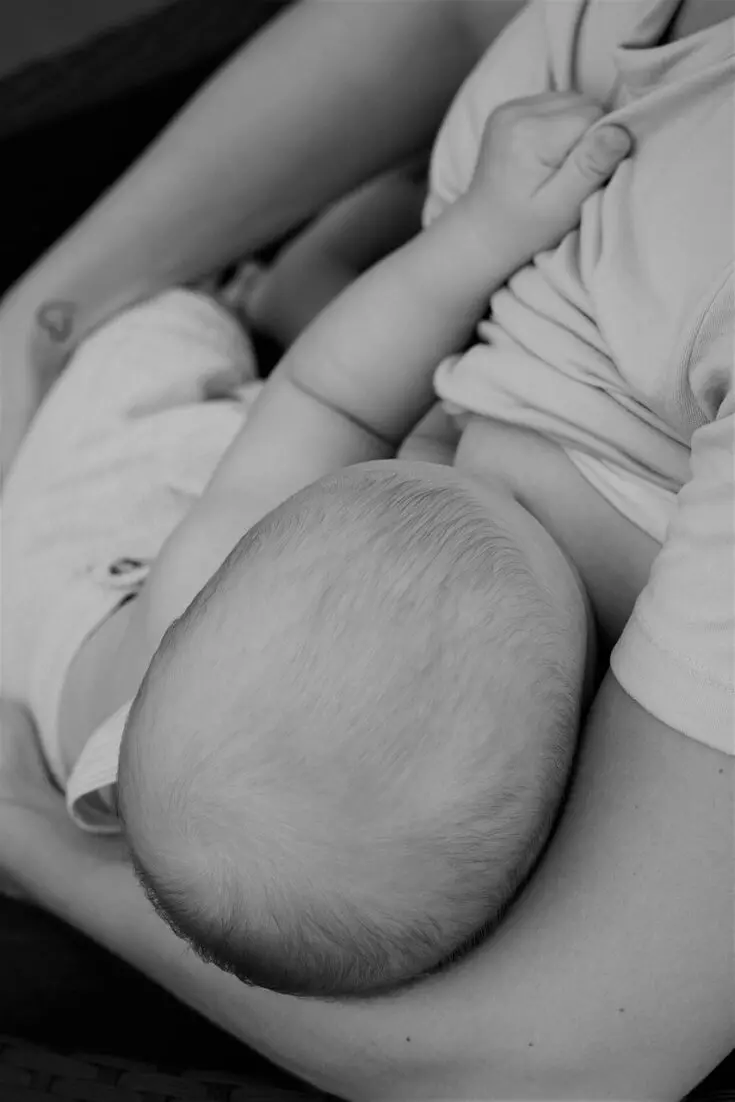If you’re expecting your first baby, then it’s very likely you have many concerns about lots of different things, including breastfeeding. This is completely normal. Today I’m focusing on breastfeeding for the first time in order to help you get a better idea of what to expect before and after you have a baby.

How Babies Approach Breastfeeding for the First Time
The good news is that babies are actually pretty smart as soon as they come out. Once dried off, they can be placed almost immediately onto your chest. This skin-to-skin contact is important for both you and your baby.
For your baby, he or she will be able to immediately get a feel for the outside world, and transition to their new surroundings. The skin-to-skin contact can relieve stress for them and start the bond between you both.
The sooner you get them used to your skin, then the more you both will get used to the closeness needed for breastfeeding the first time.
How It Should Feel For You
For you as a mother, it may feel odd to begin breastfeeding for the first time. Latching on will be largely intuitive for your baby, and they may move in a few different positions before they get comfortable. It may feel strange in the beginning, but you will quickly get used to this feeling and become comfortable with it.
If your baby is happy, then you should be happy, as long as you’re not in pain whilst doing so, but we will cover that later on in the article. If you have any questions about any of the feelings you have during feeding, ask your doctor or nurse as they will have all the information you need.

Breastfeeding In Public
One of the main stresses and worries with breastfeeding comes from feeding your child out in public. For the longest time there was a stigma attached to breastfeeding in public. Thankfully, it is becomming more and more normal to feed in public.
Some people worry about if they’re allowed to breastfeed in public, but there are laws that allow women to breastfeed in both public and private places. So, while that’s not exactly a main concern for new mothers, they may still be conscious about being stared at while feeding their baby.
To avoid this, consider buying clothes that are designed with breastfeeding in mind. These clothes allow you to easily feed your child while still providing enough cover for your privacy. You could also create a makeshift cover using a blanket of some kind.
While you won’t be able to do too much about what any other people think, just remember that it doesn’t matter what others think. The main thing is feeding and looking after your child.

Breastfeeding Pain and Concerns
It may be perfectly normal for you to experience some form of discomfort or pain when it comes to breastfeeding for the first time, and for the most part it’s not something to concern yourself with. However, if the pain continues for a prolonged amount of time, you need to see your doctor.
For example, it is perfectly normal to undergo cramps while breastfeeding, mostly due to the fact your milk has started to flow, and your uterus has started to shrink. This is a major change from the norm. Like with pregnancy, your body will undergo massive changes in a short amount of time.
Engorgement
The first few days of breastfeeding will be pivotal, and lead to changes in your body. In most cases, the first 2.5 to 3 days after birth will likely lead to your breasts being engorged, which essentially means they are filled with milk. Some women find this uncomfortable, if not painful.
For this reason, it can be beneficial to pump out your milk and store it in order to relieve the pressure on your breasts. It’s important to remember that if engorgement is left alone, it can lead to pain or even infections, which can complicate things.

Latching On Discomfort
For some women, your baby latching onto to your breast may be the only discomfort you feel. If this is the case, know that the more you get used to it, the less discomfort you will feel.
If the discomfort levels are high during feeding, try to reposition your baby. If the pain continues afterwards, then consider asking for a consultation with your doctor to ensure there isn’t something further going on.
Breast Abscess
It’s possible that the pain you’re feeling may be due to something known as a breast abscess. Breast abscesses are largely caused by infection, but there can be a few different factors at play. Typical signs of this are acute pain and redness localized around your nipple. It may even look like a lump that is filled with puss.
The only way to know for sure is to speak to your doctor and let him or her examine you. You can also find more information on the topic here from Ezra who specializes in scanning and diagnosis over a range of different health concerns.
When Does Your Milk Come In?
A common misconception when it comes to breastfeeding for the first time is that the milk appears once the baby is born. In actuality, breast milk comes in 2-5 days following a normal delivery.
Immediately after birth the body produces something known as colostrum. This is the first form of milk produced by the mammary glands immediately following delivery of the newborn. It is a very nutritious fluid, but it is only available in small amounts which quickly taper off as your milk comes in.
Colostrum is an ideal substance for your baby to have, as it is particularly high in protein and antibodies. In addition, it acts like a mild laxative, allowing your baby to relieve themselves to prevent jaundice. It also helps to coat your baby’s digestive tract and prevent infections from developing.
Overall, colostrum is a must for your baby, and your body will produce it for you. Once your baby has had this for its first few days of life, your milk will naturally come in.

How Will I Know That My Milk Has Come In?
Usually around days 2-5, your colostrum will begin to change from a thicker, stickier, almost golden-colored substance to a more mature white, thin milk.
You’ll also likely notice some signs that your ilk is coming in including:
- Your breasts usually become swollen and tender to touch.
- They usually increase by a cup size quite dramatically in a VERY short amount of time.
- They may leak milk.
- When your baby feed, you’ll hear more frequent swallowing.
- Your breast feels softer after a feed, but then it quickly fills for the next feed.
If you’re concerned about the quantity of milk that you can produce, you can always purchase milk formulas suitable for babies so that you always have a backup. Eventually, this formula may even become your primary source of milk, so it’s worth looking around to find one that suits you and your baby’s needs.
Use Breastfeeding Products If Needed
It may be that you need to invest in some breastfeeding products to help you get started. Even those who have had multiple babies will use these products if they find that they work for them.
Of course, we mentioned the benefits of purchasing milk for your baby, but breastfeeding products can refer to other things.
For example, it may refer to a breast pump. A breast pump can help a mother extract the milk without the baby, so that they could either get lactated and started, or bottle up some milk for another time.

Learn From The Experience
Everyone’s experience breastfeeding for the first time will differ, and not everybody knows everything about it. This is which is why you should take the entire thing as a learning experience.
Ask the mothers in your life how they got on, and what they learned from their own experiences. Eventually, you will be able to share your own experiences.
It’s perfectly normal to be anxious about breastfeeding, especially when breastfeeding for the first time. Hopefully, this article has helped relieve you of some stress. The main thing to remember is that your doctor and nurses are there for you, so feel free to open up to them about any concerns you may have, no matter how silly you feel the question may be.
